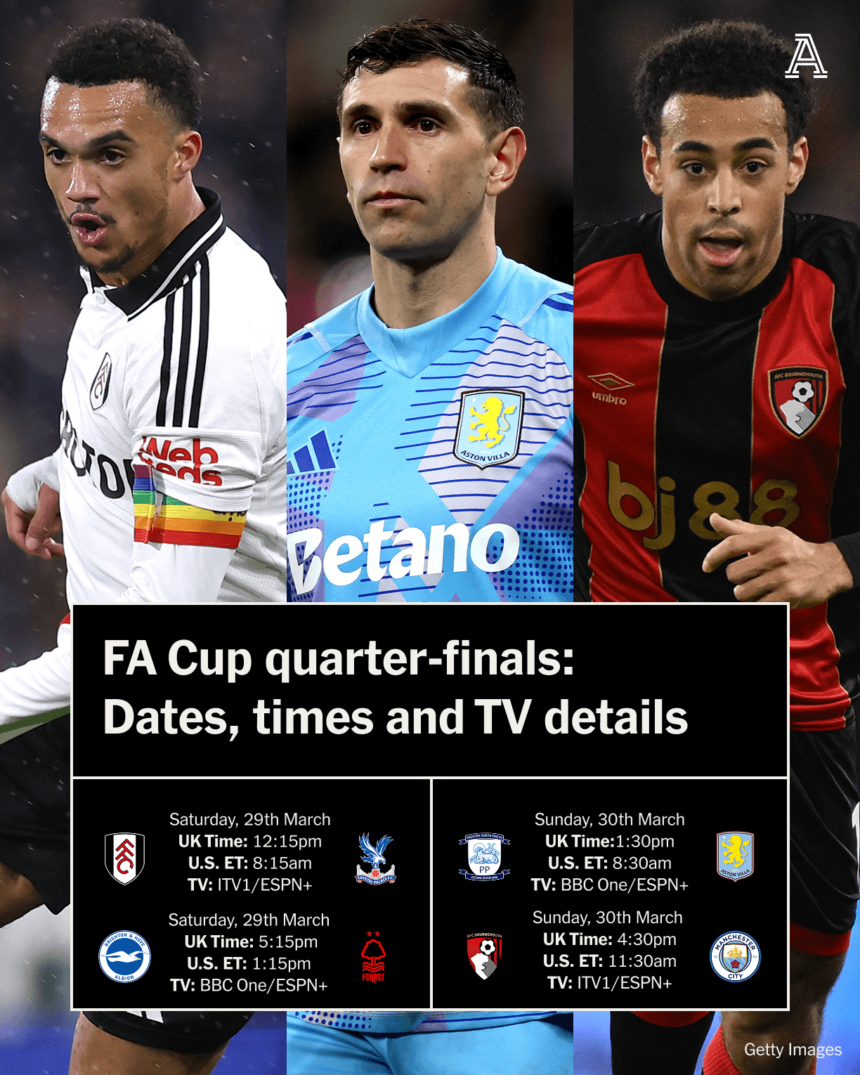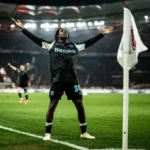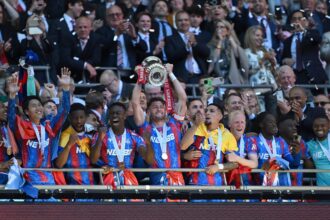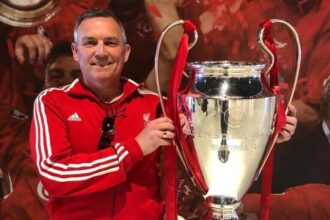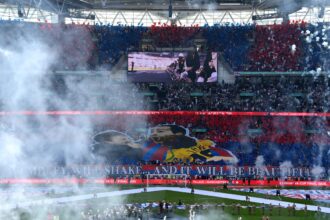Kevin Day is talking about trophy cabinets and silver allergies.
“We’ve only got two FA Cup finals to our name,” the writer, comedian and lifelong Crystal Palace fan says. “That’s one of the things about Steve Parish insisting we were founded in 1861 and not 1905 — it just adds another 44 years to the amount of time we haven’t won anything.”
Advertisement
Parish, the Palace chairman, likes his history, and opportunity knocks right now for his club to create some.
Palace are one of the four out of this weekend’s FA Cup quarter-finalists who have never won a major trophy — Fulham, Brighton & Hove Albion and Bournemouth are the others — opening the door to the possibility of a first-time winner and a 45th different name being engraved on one of football’s most famous pieces of silverware.
The oldest football competition in the world was played for the first time in 1871-72 and the winners that year were Wanderers Football Club, who seemingly lived up to their name by having various home grounds in different parts of London. They are no longer a threat though, with the club folding in the 1880s.
Refreshingly, the usual suspects are nowhere to be seen in this season’s final eight.
For the first time since the 1983-84 season, when Everton beat Watford 2-0 in the final, Duran Duran were No 1 in the UK singles chart with The Reflex and the first Karate Kid movie was just about to be released in cinemas — what a time to be alive! — Manchester United, Arsenal, Chelsea and Liverpool have all failed to make it to the quarter-finals.
Manchester City are the only member of the so-called ‘Big Six’ left in the competition and, although it would be foolish to underestimate their threat, there is a vulnerability about Pep Guardiola’s team this season that gives hope to everyone else still involved.
Everyone else includes Nottingham Forest, Aston Villa and Preston North End, three clubs who knew a thing or two about collecting trophies in the past — the distant past, in particular when it comes to the FA Cup (Forest last won it in 1959, Villa two years earlier and Preston in 1938).
In fact, ignore the presence of seven-times winners City for a moment and this is starting to feel like the romance of the FA Cup that we have all been missing.
Or is it?
Aside from the fact that seven of the eight clubs are currently in the Premier League’s top 12, it’s hard to know exactly what owners, managers, players — fans, even — are really chasing these days and whether FA Cup glory is high on anybody’s agenda.
Advertisement
Perhaps the scenes that accompanied Newcastle United’s Carabao Cup final victory earlier this month serve as a reminder that winning a trophy still matters in an era when either staying in the Premier League, or finishing in its top four (or five, as the case may be this season), appears to be the biggest motivation for the vast majority of top-flight clubs.
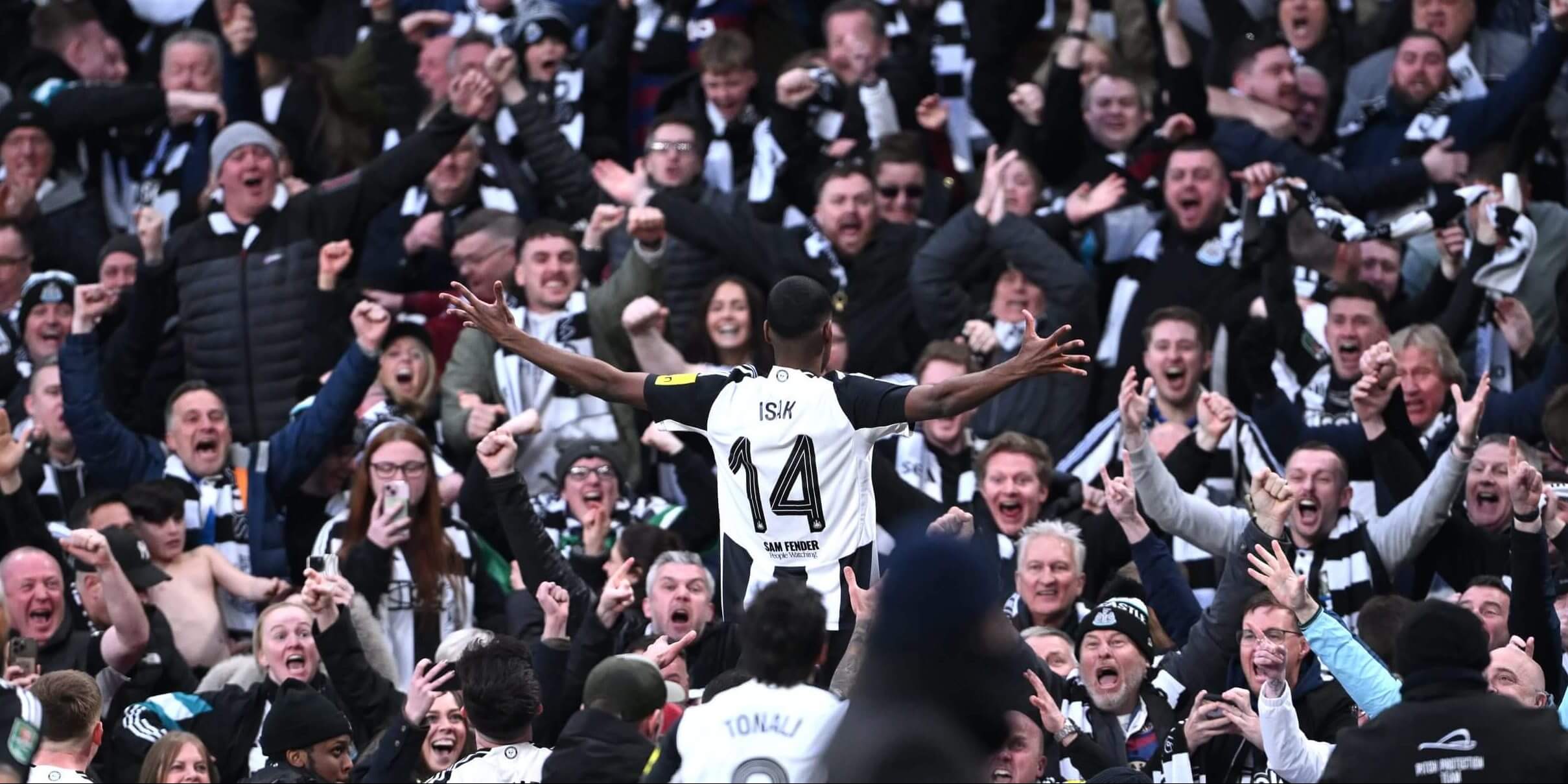
Newcastle’s Alexander Isak celebrates scoring in the Carabao Cup final against Liverpool (Stu Forster/Getty Images)
Palace fan Day sounds almost apologetic when he explains his own feelings about their ambitions. “I know there are people like Josh Widdicombe (fellow comedian and TV presenter) who said recently he didn’t care if Plymouth went down if they win the FA Cup because that’s what people will remember, though he supports a Championship team, so the financial consequences of relegation aren’t necessarily fatal.
“I’m desperate to win a trophy. But if you asked me to choose between that and Premier League safety, then I’m afraid I’d choose the unromantic answer of safety. My guess is that if you had a time machine and could offer the same choice to Wigan fans they’d say the same. That big old trophy in the cabinet can only have been a minor consolation during recent years of grief.”
A major trophy came at a price for Wigan, who beat City in the 2012-13 FA Cup final but were relegated from the Premier League three days later and have never been back in the top flight since. Currently 18th in League One, the third tier of English football, Wigan are one of only two first-time FA Cup winners this century — Leicester City, in 2021, being the other. The previous first-time winners before Wigan were Wimbledon, in 1988.
How much Ben Watson’s stoppage-time header, and that landmark day at Wembley, comforts Wigan fans now as their club yo-yo between the second and third tiers of the English game is impossible to know, but witnessing grown men crying tears of joy at cup finals over the years suggests that seeing your team win silverware, especially for the first time, isn’t overrated.
Advertisement
Either way, neither Palace nor anyone else left in this season’s FA Cup have any relegation fears to distract them. In fact, if we’re focusing purely on the four clubs among the remaining eight who have never won a major trophy, the dilemma for Brighton, and to an extent Fulham and Bournemouth too, is whether finishing in the top four/five and qualifying for the Champions League is more important than ending their wait for a major trophy.
Asked how his former club Brighton would feel about that choice, Glenn Murray smiles. “It’s almost the unanswerable question, isn’t it? I think if you asked the club from top to bottom you would get varying answers,” he says.
“We’ve seen what it meant to Newcastle to break their 70-year duck. So I’m sure as an owner, and as a fan, Tony Bloom would absolutely love to bring the first piece of major silverware to Brighton. But, equally, to get into the Champions League, it gives you that global appeal and puts you in a category that I’m sure possibly he (Bloom) himself, and I can assure you the majority of Brighton fans, never thought they’d be fighting amongst. I suppose in answer to your question, why not both?”
Financially, the FA Cup versus the Champions League isn’t a contest. The winners in this weekend’s quarter-finals will collect £450,000 in prize money, another £1million if they win their semi-final next month and double that sum again if they go on to lift the trophy on May 17. In contrast, every club received £15.6m just for taking part in the 36-team league phase of the Champions League this season.
But what about honours? What about medals? What about actually winning something? Isn’t that stuff still a big driver for at least some of the players in the modern game?
Murray, who played for four of this season’s quarter-finalists including two spells with Brighton, nods. “You’ve got Danny Welbeck and James Milner in that Brighton squad that have won a lot. But you’ve got a big majority of that group that have never won anything — and careers go by quickly. Qualifying for the Champions League and playing Juventus or Bayern Munich, yeah it will be an unforgettable day, but it won’t be as unforgettable as selling Wembley out and getting an FA Cup winner’s medal. That is the kind of dream scenario.”
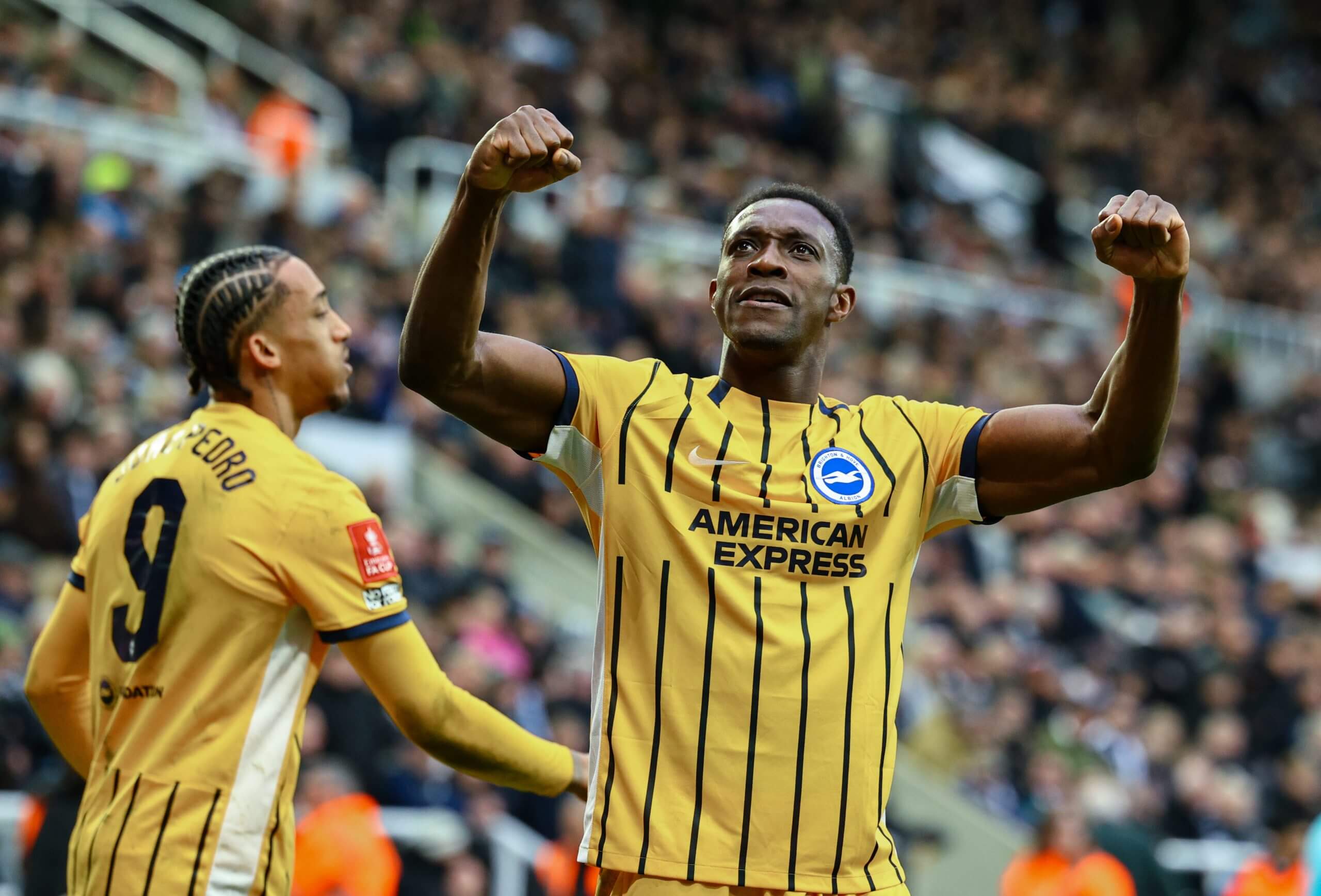
Brighton forward Welbeck won the FA Cup twice in his days with Arsenal (Alex Dodd – CameraSport via Getty Images)
Bournemouth, ideally, would have avoided visitors City in the quarter-final draw. That said, they have already beaten them at home this season, inflicting a 2-1 defeat in November that ended City’s 32-match unbeaten run in the Premier League.
“The manager (Andoni Iraola) is fearless — they go into every game believing they can win,” says Steve Fletcher, who is Bournemouth’s record appearance-holder and now a club ambassador as well as the player liaison officer.
Advertisement
Fletcher is well qualified to put Bournemouth’s journey into perspective, given that he played for the club across three decades, making his debut in 1992 when they were in the third division and his 728th and final appearance in 2013 at age 40.
“This is only our eighth season in the Premier League,” he says. “We only had two seasons before that in the Championship (before winning promotion), and prior to that we had three seasons under Harry Redknapp in the second tier in the late 1980s. We were predominantly a League One club. We even dropped down to League Two at times.”
With that in mind, it’s hard to present Bournemouth as a club trying to end a 126-year trophy drought. This is only the third FA Cup quarter-final in their history and they have never managed to get beyond this stage, all of which adds to the sense of excitement in the town now. “With a lot of the bigger teams floundering in every competition, I think it’s the best chance to do anything this season, and none more so than in the FA Cup,” Fletcher adds.
Unlike Bournemouth, Palace (in 1990 and 2016), Brighton (1983) and Fulham (1975) have all reached FA Cup finals. Day describes — and this taps into the idea that the FA Cup creates lasting memories in a way that finishing mid-table in the Premier League never will — Palace’s epic 4-3 semi-final victory against Liverpool at Villa Park in 1990 as one of the happiest days of his life and his favourite ever football moment.
Palace went on to lose the final to Manchester United in a replay and were also beaten by them in extra time in 2016, the day Jason Puncheon came off the bench to give Palace a 78th-minute lead and their manager Alan Pardew did his “dad dance” on the touchline in celebration, before goals from Juan Mata and Jesse Lingard broke their hearts.
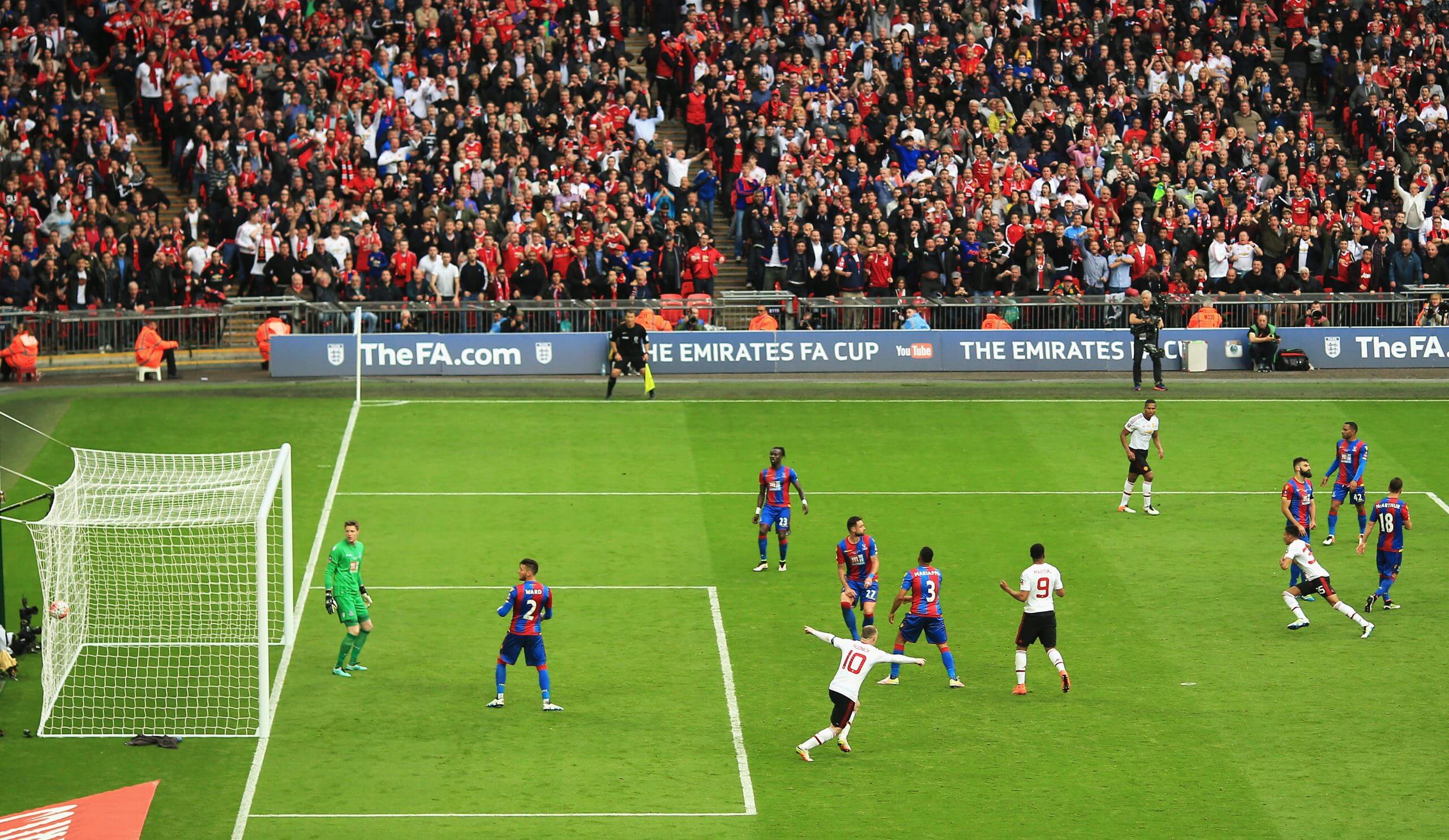
(Ben Hoskins – The FA/The FA via Getty Images)
The story didn’t have a happy ending in that respect, but an FA Cup run tends to leave an indelible mark on everyone connected with a club. Could anyone at Palace say the same about finishing 11th, 10th, 15th, 14th, 11th, 12th, 14th, 14th, 12th, 11th and 10th (they are currently 12th) in the Premier League over the past decade or so? Or is it all about consistently playing at the highest level season after season?
“I think this is partly generational,” Day replies. “I’ve been through two administrations, I’ve cried when we were 15 minutes away from going out of business, so I know what it’s like to think that you’re going to lose your club. So, as far as I’m concerned, finishing 12th every season in the Premier League — I’d bite your hand off for that.
Advertisement
“But there are younger fans who want more than 12th. They want Europe, they want silverware, and you fully understand that. You sound like a terrible old granddad in the corner saying, ‘Careful what you wish for, because that’s what Charlton wanted.’ (Charlton Athletic, Palace’s London neighbours, had seven straight seasons in the Premier League at the start of this century, but after manager Alan Curbishley stepped down in summer 2006 having just finished 13th, they were relegated a year later. They have never been back to the top flight and are now playing their fifth season in a row in League One.)
“Having said all that, if we win a piece of silverware, I’d be a mess. As much as I didn’t care who won between Newcastle and Liverpool, I got tearful watching (Newcastle-supporting TV presenters) Ant and Dec get tearful.”
Brighton, Palace’s bitterest rivals, have enjoyed a spectacular rise, bearing in mind they had spent only four seasons in the English top flight since being formed in 1901 before winning promotion to the Premier League eight years ago, and were playing in front of home crowds of little more than 2,000 as recently as the late 1990s.
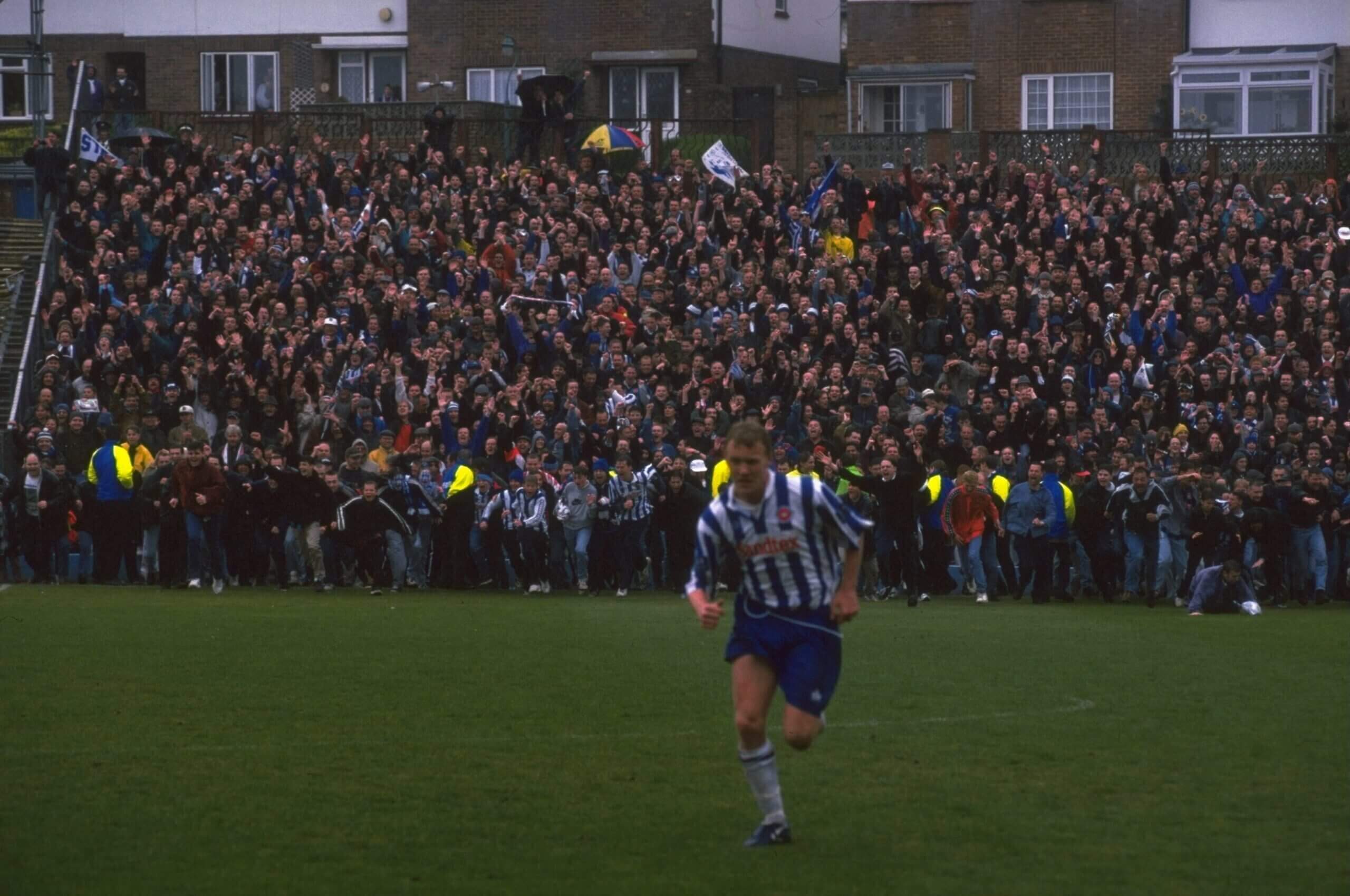
Brighton fans invade the pitch in their final ever game at the Goldstone Ground in 1997, a Division Three match against Doncaster Rovers (Stu Forster /Allsport)
Now regarded as a model club with one of the best player recruitment departments in the world, Brighton finished sixth in the Premier League two seasons ago, reached the round of 16 in the Europa League last year and were FA Cup semi-finalists in 2019 and 2023. It’s been a golden era, for sure, but do Brighton, who are at home to Forest today, need something tangible — a trophy — at the end of it?
“Well, the way that you put that there, ‘at the end of it’, it wouldn’t be the end of it; it would still be the beginning,” Murray says. “Because I’ve seen Brighton and Bournemouth crash through so many glass ceilings where people thought they’d reached their peak.
“You speak to any Brighton fan and they feel like they’re dreaming, because they just didn’t think this was achievable. They didn’t think staying in the Premier League was achievable. They didn’t think getting into Europe was achievable. Is silverware achievable?
“But it keeps happening, so it wouldn’t be the end. It would just be part of the story and this progression that Tony Bloom’s put in place. I honestly believe the club can just keep getting better and better.”
Advertisement
For Fulham, who host Palace today, success in this season’s FA Cup would be timely, mindful that it’s exactly 50 years since their only previous appearance in a domestic final, which ended in a 2-0 defeat against West Ham in this competition. An anniversary dinner is being held on May 9, eight days before this season’s final, to mark the occasion.
“I would love to have the record taken away from us of being the only Fulham team to have got to Wembley,” says Les Strong, who was in that team and is still a regular at Craven Cottage in his role as a matchday host.
“That season I think we played 56 games. I played in 54 of them and got injured two weeks before the FA Cup final. Getting to Wembley was 11 games — that’s still a record and it will never be beaten. We had three games in the third round against Hull (in the days of ties going to multiple replays if there was no winner), four in the fourth round against Forest, and we played Hull and Forest in the league then too, so we actually played two teams nine times in five weeks. I was asking their players, ‘How’s the dog?’.”
The day of the final was eventful.
Strong was at the Old Bailey, a prominent court in central London, in the morning for a case about the Stylo-branded boots the Fulham team were supposed to be wearing in the final as part of a sponsorship agreement (they ended up blacking out the logos on their ‘own’ boots instead). There was a complication with their shin pads too.
“The kit man had forgotten to pack them!” Strong says, laughing. “So we gave one of the coppers (the police officers on duty at Wembley) who had a motorbike some money and he went down to the local sports shop to get 12 pairs. Typical Fulham!”
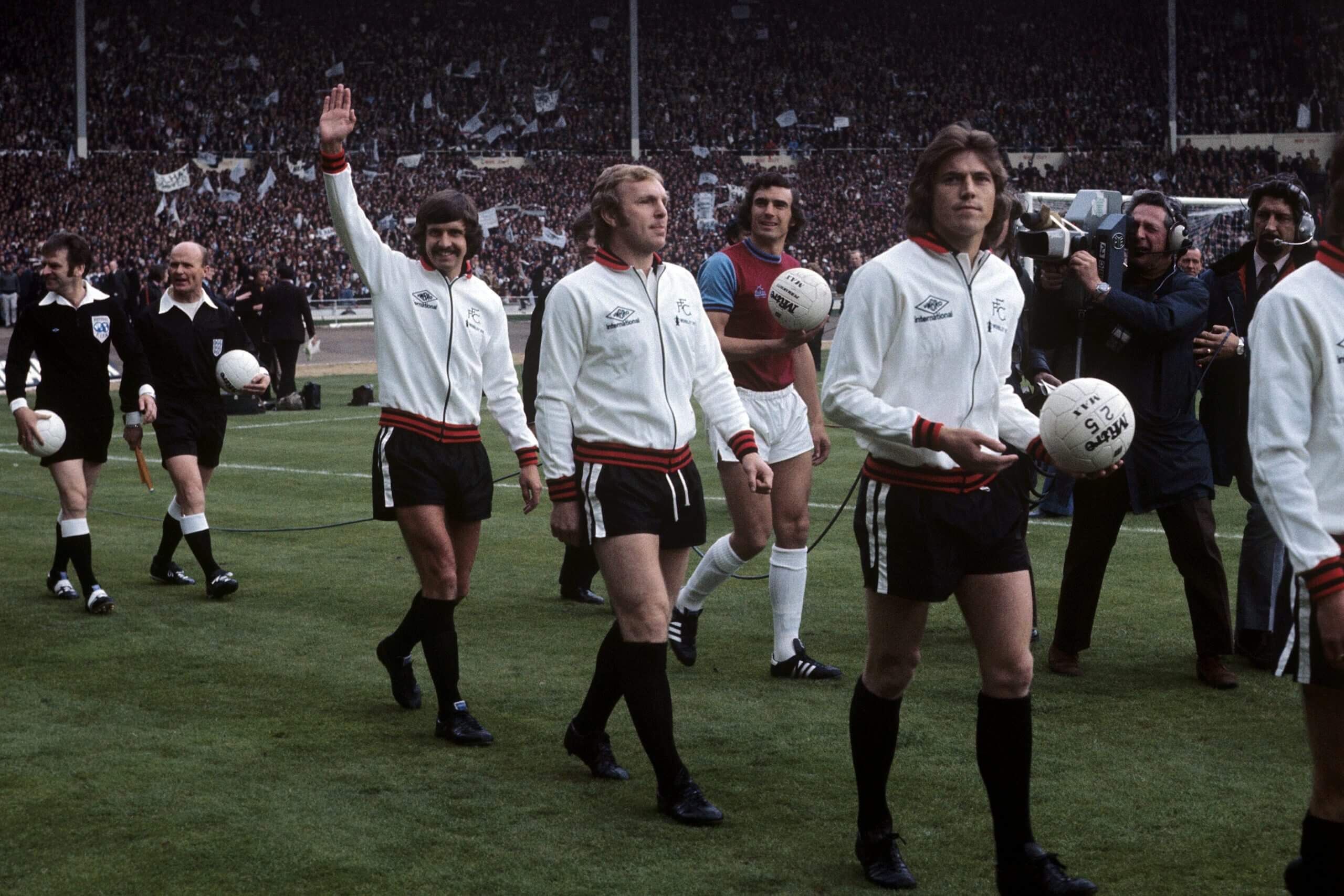
Alan Slough, Bobby Moore and John Mitchell walk onto the Wembley pitch for Fulham in 1975 (S&G/PA Images via Getty Images)
Times change.
Replays, controversially, are no more, one substitute per team has increased to nine, and Uber, rather than the local “copper”, comes to the rescue of sports stars nowadays if anything has been left behind.
As for the prestige attached to the FA Cup itself, there’s no escaping that the competition has been devalued, not helped by managers — and this happens at Championship level as well as in the Premier League — playing ‘second’ teams in the early rounds to rest players for league games.
Advertisement
Interestingly, several of this season’s quarter-finalists have picked close to their best line-ups in the competition this season. Brighton’s first-year coach Fabian Hurzeler has made only eight changes in total across their three ties. Unai Emery at Villa (nine), Palace’s Oliver Glasner (11) and Iraola at Bournemouth (12) have adopted a similar approach. At the other end of the scale, Forest’s Nuno Espirito Santo has made 27 changes and Guardiola 28 at City.
“There are two reasons why I play with a strong squad,” Hurzeler told The Athletic on Friday. “From the experience I had in the German Cup (with St Pauli), it is very important that we don’t make too many changes. I want to build a consistency, a connection between the players, and therefore I can use the FA Cup as an extra game.
“And I said it from the beginning that I love cup games because it is always a do-or-die game. It’s always a chance to win a title. I love to achieve something, I am very ambitious, the club is ambitious.”
A potential scenario here is that two of the clubs who have never won the FA Cup end up meeting in the final — something that has not happened since 1970, when Chelsea faced Leeds United in a game (well, two games, as it also went to a replay) that should have come with a warning that some people might be upset by the level of violence.
The replay, which attracted an average TV audience of more than 28 million in Britain (at a time when the population was around 56 million), is generally regarded as one of the most brutal games in the history of English football. Incredibly, only one player was booked.
The late, great Hugh McIlvanney wrote in UK newspaper The Observer: “At times, it appeared that Mr Jennings (the referee) would give a free kick only on production of a death certificate.”
Palace versus Brighton at Wembley in May would have a lot to live up to in that respect.
(Additional contributor: Will Jeanes)
(Top photos: Getty Images; design: Demetrius Robinson)


